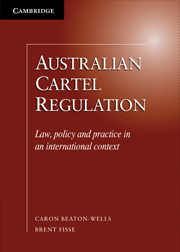Book contents
- Frontmatter
- Contents
- About the authors
- Preface
- Acknowledgements
- Abbreviations
- 1 Introduction
- 2 The legal framework governing cartel conduct
- 3 Collusion (contracts, arrangements, understandings)
- 4 Cartel and other provisions
- 5 Fault elements of the cartel offences
- 6 Individual liability for cartel conduct
- 7 Corporate liability
- 8 Exceptions
- 9 Enforcement policy
- 10 Immunity and cooperation policies
- 11 Sanctions
- 12 Compliance and liability control
- 13 Conclusion
- Appendix Trade Practices Act 1974 (Cth) Pt IV Div 1; Pt IV Div 2 s 45
- Index
10 - Immunity and cooperation policies
Published online by Cambridge University Press: 05 December 2011
- Frontmatter
- Contents
- About the authors
- Preface
- Acknowledgements
- Abbreviations
- 1 Introduction
- 2 The legal framework governing cartel conduct
- 3 Collusion (contracts, arrangements, understandings)
- 4 Cartel and other provisions
- 5 Fault elements of the cartel offences
- 6 Individual liability for cartel conduct
- 7 Corporate liability
- 8 Exceptions
- 9 Enforcement policy
- 10 Immunity and cooperation policies
- 11 Sanctions
- 12 Compliance and liability control
- 13 Conclusion
- Appendix Trade Practices Act 1974 (Cth) Pt IV Div 1; Pt IV Div 2 s 45
- Index
Summary
Introduction – the role of immunity and cooperation policies in anti-cartel law enforcement
Competition authorities employ a range of strategies to facilitate detection, investigation and ultimately civil or criminal proceedings against cartel conduct. The most well-known and widely adopted of these is the policy of offering the first eligible cartel member immunity from penalties or proceedings. Based on the game theoretic model known as the ‘prisoner's dilemma’, the use of an immunity policy in anti-cartel law enforcement is justified on the basis that it is the most effective and least costly mechanism for detecting activity that is generally systematic, deliberate and covert. It is also seen as a means of deterring the formation of cartels. These benefits are regarded as outweighing any adverse effects in terms of lower penalties overall as well as any adverse political or moral implications. Moreover, the track record, particularly in major jurisdictions such as the US and EU, suggests that immunity policies work. In these and other jurisdictions, such policies are reported as having yielded investigations and prosecutions of numerous cartels that have resulted in substantial penalties. Following the example set by the US with its revised corporate leniency policy in 1993, more than 50 jurisdictions now have some form of anti-cartel immunity policy. The ACCC Chairman has described the ACCC Immunity Policy as ‘absolutely vital’ in the commission's efforts to crack cartels and as its primary source of disclosure of cartel activity.
Immunity policies, or leniency policies, as they are sometimes called, often incorporate or are supplemented by a policy that encourages other members of the cartel to cooperate in return for a reduced penalty and other possible rewards despite having missed out on total protection from proceedings or penalties. In the civil context, such a system for ‘settlement’ is seen increasingly as having considerable value for enforcers in that it enables them to secure timely outcomes, allocate their resources more efficiently and increase their enforcement activities overall, thereby achieving greater deterrence. It also offers substantial benefits to cartel participants. They obtain penalty reductions and potentially also limit their exposure to follow-on private actions for damages. They have a greater sense of being involved in the disposition of a case than otherwise would be possible. They also achieve certainty and finality through the expeditious resolution of the allegations against them.
- Type
- Chapter
- Information
- Australian Cartel RegulationLaw, Policy and Practice in an International Context, pp. 378 - 420Publisher: Cambridge University PressPrint publication year: 2011

